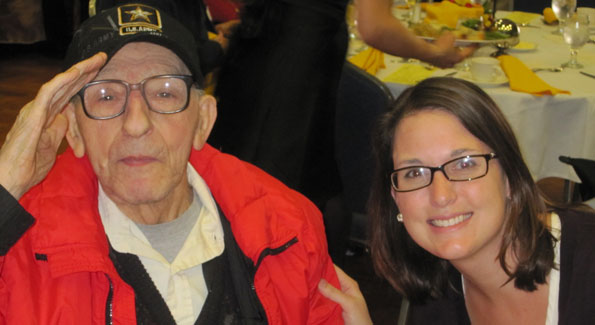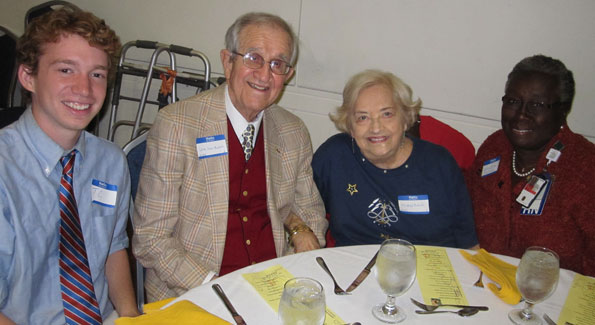GW’s Center for Civic Engagement and Public Service integrates academic and co-curricular service-learning with internships.
By Jane Hess Collins

PFC Angelo Macaluso, a WWII veteran, can still snap a salute. GW graduate student Alden Wells said she “can’t think of a better way to spend my afternoon than with our veterans.” Photo by Jane Hess Collins.
College students have a lot of demands. They want better food, better dorms, less homework. Amy Cohen, the executive director of George Washington University’s Center for Civic Engagement and Public Service, has yet another demand from the students. They want to serve more often.
Not that she’s complaining. As the former Learn and Serve America director herself, Cohen was part of the nationwide team that worked so hard to get kids engaged in service in the first place. And she’s happy to reap what she helped sow.
“We are getting so much demand from students to serve,” Cohen said. “It’s become an expectation.
”
Over 280 GW students volunteered to build a school in Guatemala with sustainable products or serve in six other locations over the winter break. Problem was, there were only 120 “alternative break” positions available throughout Central America. In the District, over 2,000 students volunteered during last fall’s second annual Freshman Day of Service in partnership with the 9-11 Day of Service and Remembrance, along with 14 community partners. Three hundred GW students volunteer through eight partner organizations in GW’s DC Reads program in the district’s public schools throughout the school year, and this year’s spring “alternative breaks” program include 25 students serving locally.
Announced in October of 2009 by GW president Steven Knapp as part of GW’s inaugural Colin Powell Public Service Award, the Center for Civic Engagement and Public Service, said Cohen, is the convener, cheerleader, and promoter of service events and activities that GW students engage in every day.
Co-curricular service, or the service that students choose to do outside of class, has thousands of students knocking at Cohen’s door. Aside from the examples mentioned previously, last year 2,500 GW students served with the Neighbors Project, which addresses local needs in education, senior services, homelessness and hunger, and partners with 45 organizations in all eight of the District’s wards. With all of those options, the Neighbors Project helps a beginning volunteer focus on what service interests them the most.
Academic service-learning, a teaching method that involves service-focused experiential education, is a second part of the Center’s programs that Cohen wants to develop. Many of the GW faculty, Cohen said, already have service built into their curriculum, and she is looking for ways to expand on that. Money talks, and Cohen has a small grant from Learn and Serve America (through Serve DC) to incentivize the faculty to develop stronger community engagement and to support students who help manage the critical community partnerships.

(l to r) TC Flowers, Pearl Harbor survivor CDR John Budzik, Mildred Budzik, Geraldine Feaster. The GW’s Student Veterans of America chapter hosted a lunch for local military veterans. Photo by Jane Hess Collins.
Since 80% of GW students intern or volunteer anyway, Cohen wants to integrate service-learning with internships to guide students to public service careers. “Here we are in DC,” she said. “GW attracts students who want to give back. We attract students who want to become involved in the issues of the day.”
Just ask Alden Wells, who chose GW for her graduate work in public policy because of the school’s partnerships and involvement with the Washington, DC community. “It makes the student experience very meaningful,” she said.
Or ask TC Flowers, a pre-med major who was so inspired after a GW service trip to Peru last January that he wants to focus on public health and community development after he becomes a doctor. The trip to Peru, where he helped build a community center in rural Cuzco, “changed my life. It changed my perspective on everything that goes on. It made me realize that you can do something about poverty.”
Students get “real, hands-on work,” said Cohen. “They have the real, tangible connection to people in the community. Students feel good when they give back.”
Having been on the job just a few months, Cohen added that, “I’ve been so impressed with how serious students are about how they behave in the world. They’re students who either have a vision or are developing a vision of how they can be better citizens, and how they can improve our world.”
After each Center-sponsored service event, the students talk and reflect on their experience, where, Cohen says, students learn that “serving with others who are not like you helps you to understand the world and helps you to be a better person in life.”
What’s next for the Center? Cohen wants to focus on one or two specific issues to make a healthy impact in the local community. And she’s looking for partners in that strategy -any combination of corporate, local government or a faith-based organization will do.
The Center wants to hear from you.
Jane Hess Collins helps and encourages people to give back through her writing, speaking, coaching and workshops. She also established game nights for at-risk families throughout the country. You can contact her at www.getoutandgiveback.com.




